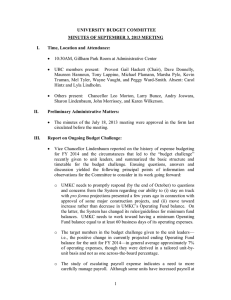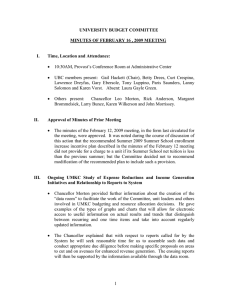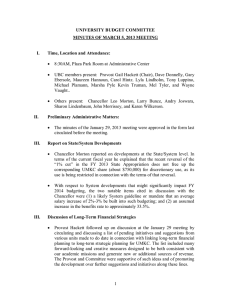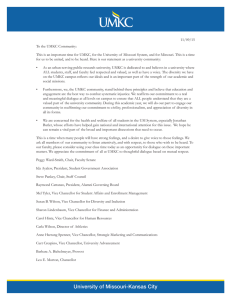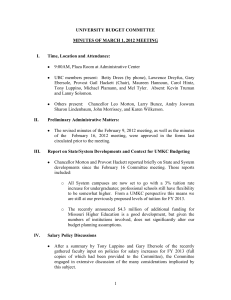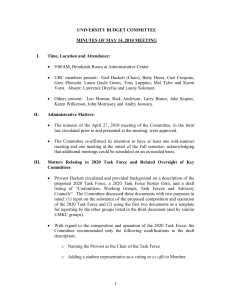Report to the UMKC Faculty Senate of the Examination of UMKC’s
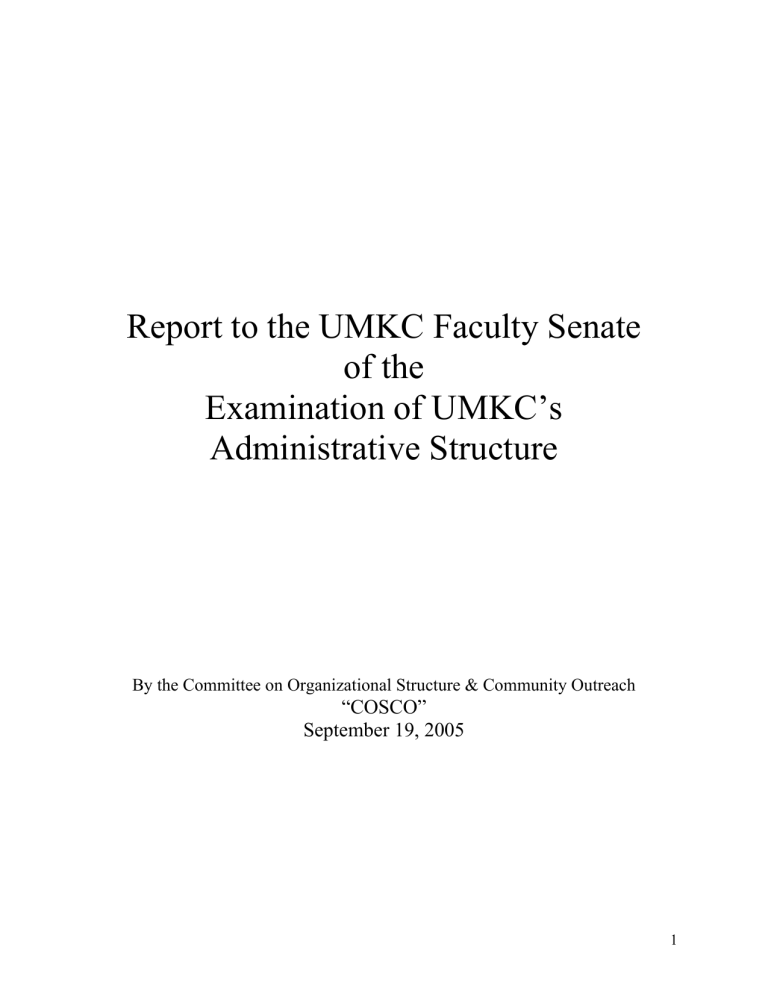
Report to the UMKC Faculty Senate of the
Examination of UMKC’s
Administrative Structure
By the Committee on Organizational Structure & Community Outreach
“COSCO”
September 19, 2005
1
EXECUTIVE SUMMARY
I. Findings and Observations
•
The most glaring deficiency in the current organizational model (See Exhibit A and Exhibit A-
1) is the equal status given all four UMKC administrative departments (Academic Affairs,
Administration and Finance, Advancement and Student Affairs), despite the fact that UMKC is an academic institution.
•
In the committee’s view, the model has led to inefficiencies, a dysfunctional organization, excessive salary levels in the administration, and disproportionate power by the support departments, especially Administration and Finance.
•
Examples of problem areas include Advancement, response to Diversity, creations of splitfunded positions between departments creating divided loyalty problems, excessive salary levels for administration units when compared to academic units, duplication of functions, turf protection and the disproportionate power of the support units, especially the Department of
Administration and Finance.
•
Upper level administrative appointments have been made without formal search processes.
II. Recommendations
•
COSCO recommends major changes in the overall organization of UMKC
UNIVERSITY OF MISSOURI-KANSAS CITY
PROPOSED ORGANIZATIONAL CHART
President
Chancellor Office of Advancement
Office of
Comptroller
Office of Diversity
Vice Chancellor for Administration
Provost/Executive
Vice Chancellor for Academic
Affairs
Vice Chancellor for
Student Affairs
Faculty Senate
Staff Council and Advisory
Committees
Vice Chancellor for University
Development
Director of Intercollegiate
Athletics
2
•
Recommendation # 1
The Provost as the Chief Operating Officer
Under the proposed organizational chart set forth above, the Provost and Vice Chancellor for
Academic Affairs, is the Chief Operating Officer (COO) of the UMKC campus, second in command, immediately under the Chancellor, the Chief Executive Office (CEO). Under this proposed model, all other Vice Chancellor’s (Administration, Student Affairs and
Development) and the Office of the Comptroller (new office under the model) report to the
Provost. When the Chancellor is unable to act (because of absence, illness, etc.) the Provost will be the acting CEO.
•
Recommendation # 2
Splitting the Finance Function from the Administrative Function
The committee recommends that the current department, consisting of Administration and
Finance, be split into two distinct departments, namely Administration and the Office of the
Comptroller. The Administration Department would report directly to the Provost (the COO).
The Office of the Comptroller would report directly to the Provost and the Chancellor.
•
Recommendation # 3
Major Restructuring of Advancement and Development
The committee recommends that the current department, “University Advancement,” be separated into two separate and distinct departments, namely, the Office of Development, which will report directly to the Provost, and the Office of Advancement, which will be a direct support unit for the Office of the Chancellor. The Department head of the latter unit would not have Vice Chancellor status; instead, the person in charge would have a salary consistent with a middle manager (director level) or assistant Vice Chancellor.
•
The Office of Development will be strictly confined to fund-raising with a small central administrative staff; most of the current staff should be in the Academic units primarily supervised by the Dean.
•
Office of Advancement will report to the Chancellor and will be the public face of UMKC. It will have two divisions:
—Alumni, Community and Public Affairs
—University Communications (which will be moved from Student Affairs)
•
Recommendation # 4
A shared-governance model, —faculty must be major contributors to budgeting and other policy decisions
•
Recommendation # 5
More faculty involvement in administrative hiring decisions
Hiring to fill any administrative position that includes within its title the word “provost” or
“chancellor” must be filled through a formal search process, including the utilization of a search committee which includes significant representation from the UMKC faculty.
3
Part I
Examination of Overall
Administrative Structure
4
I. INTRODUCTION
The Committee on Organizational Structure and Community Outreach (COSCO) was established as a standing committee of the UMKC Faculty Senate at its regularly scheduled meeting on
March 15, 2005. The purpose of the committee as established by the Faculty Senate is as follows:
Whereas i) shared governance between faculty and administrators and ii) Community Outreach by the UMKC campus, are two goals shared by the
Faculty Senate and President Floyd and his staff from the University system wide
Whereas achieving these goals requires a thorough understanding of the activities that each of the various participating groups undertake in their day to day work;
Whereas transparent information exchanges (financial and otherwise) between the faculty and the administration is absolutely essential to create a climate of trust that will lead to the most effective shared governance between faculty and administration;
Whereas free and open information exchanges can be impeded by overlapping and duplicative functions within any organizations;
Whereas a climate of trust between UMKC and the Greater Kansas City Community can be achieved if the faculty and members of the Greater Kansas City Community
Now therefore the UMKC Faculty Senate does hereby establish a new committee
“The Committee on Organizational Structure and Community Outreach” whose charge, with the above recitals in mind, is to examine the internal relationships as they exist on this campus as well as the various relationships between the campus and the Greater Kansas City Community and then to report to the full Senate its findings
Membership is open to all faculty subject to a manageable limit. The current membership totals ten faculty members. They are as follows:
Edwin T. Hood
School of Law
Gary Ebersole
College of Arts & Sciences
Ruby M. Hulen Professor of Law
36 years of service
Professor of History and Religious Studies
10 years of service
Karen Bame
School of Biological Sciences
Alfred Esser
School of Biological Sciences
16 years of service Marion Merrell Dow Professor
14 years of service
5
Philip Crossland
Bloch School of Business
Associate Professor of Business
18 years of service
Steven Driever
Department of Geosciences
Randy Gardner
Bloch School of Business
Professor of Accountancy
22 years of service
Jerry Knopp
School of Computing & Engineering
28 years of service Science and Electrical Engineering
College of Arts & Sciences College of Arts & Sciences
Chair & Associate Professor of Theatre Curator’s Professor of Chemistry
24 years of service 13 years of service
Soon after COSCO was formed at that March meeting, the committee members began to meet.
Our main goal was to thoroughly investigate the current organizational structure of UMKC for the dual purposes of (1) understanding the various administrative departments and their roles in advancing the educational mission of UMKC, and (2) determining where and when dysfunctional operations were occurring, especially if they were wasting university resources.
Since this past March, the committee has met as a formal committee approximately 30 times.
Early on, we met with President Floyd who requested that we channel our information requests through the Vice Chancellor of each of the administrative departments at UMKC. Toward that end, we have met as a full committee with former Provost Bill Osborne (2 occasions), Pat Long, the Vice Chancellor of Student Affairs (2 occasions), Bill French, the former Vice Chancellor of
Advancement (2 occasions) and Larry Gates, the Vice Chancellor for Administrative and
Finance (2 occasions). Interim Chancellor Steve Lehmkule and Interim Provost Bruce Bubacz attended several of the committee meetings. Moreover, we visited with other employees of the
Provost’s office, including Vice Provost Jeff Thomas, Vice Provost Bibie Chronwall and Vice
Provost Mary Lou Hines. We also visited with Linder Gill Taylor of the Center for the City and many other UMKC employees.
We are currently investigating UMKC’s relationship with the Kansas City Repertory Theatre and will have a separate report on this area of inquiry at a later date. In addition to the various individuals that met with the full committee, those individual members of COSCO assigned to the writing of specific reports met separately with different UMKC employees.
Finally, various committee members prepared detailed questions for each department head, which were then forwarded to them for their respective responses. Those various questions and the responses are set forth in appendices to this report.
This Part I of the Report examines the overall administrative organization at UMKC. In separate reports we will examine each of the respective administrative departments.
6
II. EXAMINATION OF OVERALL ORGANIZATION OF UMKC
A) Findings and Observations
The most recent organizational structure (dated February 14, 2005), as set forth in Exhibit A below, demonstrates that UMKC has four major administrative departments, all reporting directly to the Chancellor. The administrative departments and their respective heads are as follows:
2. Vice Chancellor
Acting Head of Advancement
Administration & Finance
EXHIBIT A
ORGANIZATIONAL CHART
(See Exhibit A-1 attached for larger view)
7
During its deliberations, the committee found several problems with the above organizational model. The equal status given all four departments, despite the fact that UMKC is an academic institution, is the most glaring deficiency in this model. In the committee’s view, the model has led to inefficiencies, a dysfunctional organization, excessive salary levels in the administration, and disproportionate power by the support departments, especially Administration and Finance.
A few examples will illustrate these points.
University Advancement, the fundraising department, has secured funding in the past for scholarships and fellowships. In certain situations, the selection of the recipients of the awards is done by a group of business and community leaders not employed by UMKC. After the funds were secured, at least in certain instances, the Advancement Department (and not the Provost’s
Office) has been transmitting the information with respect to the candidates to this outside selection committee. Moreover, representatives of the Advancement Department have attended the meetings where the recipients have been selected by such selection committee. COSCO is of the opinion that input from Advancement is not the wisest policy as the selection committee needs the advice from someone experienced in assessing the applicant pool—namely an academic, not the fundraisers who secured the funding. The committee is of the opinion that if the Vice Chancellor for Advancement reports to the Provost, the current liaison role of
Advancement, as noted above, would be a much different one indeed.
A second example was the recent creation of a new position (jointly funded by Academic Affairs and Student Affairs), titled the Vice Provost for Undergraduate Affairs and Student Engagement.
This position was established as a liaison position between Academic Affairs and Student Affair and filled without a formal search. Vice Chancellor Long cited the joint funding of this position as an example of the cooperation between Student Affairs and Academic Affairs. When parties are at arms length (i.e., on the same level on the organizational chart), however, it takes longer to work out these relationships. Furthermore, if the department heads do not cooperate with each other, it is never resolved satisfactorily. If the supporting departments report to the Provost, the lack of cooperation would be eliminated. Furthermore, it is probable that a liaison position will not be necessary when the supporting organization directly reports to the Academic Affairs
Department. In this connection, it is interesting to note that former Provost Osborne opined that approximately $1.4 million could be saved if Student Affairs and Academic Affairs were combined into one unit.
A third example of the deficiencies in the current model concerns UMKC’s response to diversity
(Affirmative Action and Diversity in Action). Currently, all four departments have employees within their respective departments dealing with affirmative action and/or diversity issues.
Arguably, this tends to lead to duplication of function and inefficiencies. The campus needs a strong affirmative action/diversity department that covers all areas of campus life (faculty, staff and students). The effort must impact directly on all aspects of affirmative action/diversity and the committee is of the opinion that a department responsible to the Chief Operating Officer (the
Provost under our recommended model) is the best vehicle to achieve this result.
A fourth example illustrating the weaknesses of the current organizational model concerns the salary levels and respective titles of various employees of the four departments of the UMKC central administration. The raises given to central administration employees, when compared to the faculty and staff in the various academic units, was one of the more controversial matters that occurred during former Chancellor Gilliland’s administration. But, while it has been difficult for
8
faculty and staff in the academic units to accept the proliferation of Vice Provost positions in the
Academic Affairs office, it has been more difficult for them to accept the dramatic salary increases granted to employees of the support units. It is interesting that the principal rationale for the raises in the four departments was new and added responsibilities justifying new job titles and increased salaries. Few of these new positions underwent any thorough national search similar to requirements for new faculty positions.
There is another explanation, however, for these raises and job classifications. During the period of study of central administration salaries, we noticed a clear pattern. Raises in central administration were not limited to the Provost’s office. There was a tendency for raises to be duplicated in other central administration units.
We now have a significant disparity between salary levels in central administrative support units when compared with similar jobs in the academic units. In some instances, university employees with first level college degrees are receiving significantly higher salaries than distinguished faculty members with PhDs with significantly more years of service at UMKC than the employee of the supporting units. The overriding and compelling question is whether the salary differentials are inflated beyond what the qualifications and experiences of the administrative employee justify. The committee is of the view that the salary levels in many instances are not.
The committee is of the view that the equal status of the four administrative department heads has contributed to the inequitable nature of the current compensation levels at UMKC. Thus, when Academic Affairs argues for an additional share of revenue to increase the salary level of employees as a result of reclassification, etc., the other support units, being of equal status in the organization chart, will argue for parity of treatment. Thus, in the committee’s view, the competitive nature of the structure, as well as the similar ranking of Academic Affairs and the support units in the UMKC organizational structure, has led to a misallocation of resources and inequity in the salary structure.
Fifth, COSCO is of the opinion that the equal ranking of the four administrative departments within the organization has led to duplication of functions. We have already indicated the duplicative nature of UMKC’s affirmative action program. Another area that appears to have overlapping responsibilities is the public relations effort of UMKC. With the exception of
Administration and Finance, all of the administrative units appear to have some responsibility for the public relations effort of UMKC. COSCO is concerned that the dysfunctional nature of the overall public relations effort of UMKC may cause inefficiencies and proliferation of unnecessary staff.
Sixth, equal status of the four administrative departments units has lead to turf protection. For example, this past March President Floyd announced to all departments that a hiring freeze was in effect for the UMKC campus. However, the policy allowed hiring to proceed upon the approval of the Vice Chancellor of the applicable administrative department. COSCO members discovered that hiring approval was apparently given in some situations after the announcement.
Had the President given this authority to the Provost, rather than the Vice Chancellor of each unit, the committee is of the opinion that it would have been more difficult for frozen positions to be unfrozen. The President, as acting Chancellor, did not have the time to make these decisions.
Arguably, however, the Provost would have the time.
A final example of the weakness in the present structure concerns the disproportionate power of the support units. The Vice Chancellor of Administration and Finance has a disproportionate
9
amount of power in this current structure because of the power to possess and control all of the financial information of UMKC. Because of the complexity of UMKC finances, few administrators and faculty members, outside of Administration and Finance, have the depth of knowledge and financial background to understand the big picture. Because of the position in the organization chart of Administration and Finance, it is more difficult for Academic Affairs to challenge the decisions and recommendations of this department. For a department that holds the campus purse strings to have more power and influence than the Provost seems nonsensical at best.
III. Recommendations
COSCO strongly recommends the following changes in the organizational chart as follows:
UNIVERSITY OF MISSOURI-KANSAS CITY
(Proposed Organizational Chart)
President
Chancellor Office of Advancement
Office of
Comptroller
Office of Diversity
Vice Chancellor for Administration
Provost/Executive
Vice Chancellor for Academic
Affairs
Vice Chancellor for
Student Affairs
Faculty Senate
Staff Council and Advisory
Committees
Vice Chancellor for University
Development
Director of Intercollegiate
Athletics
10
Recommendation # 1
UMKC should have a Provost/Executive Vice Chancellor who is the Chief Operating Officer
Under the proposed organizational chart set forth above, the Provost and Executive Vice
Chancellor for Academic Affairs, is the Chief Operating Officer (COO) of the UMKC campus, second in command, immediately under the Chancellor, the Chief Executive Office (CEO).
Under this proposed model, all other Vice Chancellor’s (Administration, Student Affairs and
Development) and the Office of the Comptroller (new office under the model) report to the
Provost. When the Chancellor is unable to Act (because of absence, illness, etc.) the Provost will be the acting CEO.
Some of the reasons for this model have already been set forth above. The most compelling reason, however, is the very essence of why UMKC exists: the responsibility to educate our students. The administrative department that has the principal responsibility for assuring that our students receive the best education possible is Academic Affairs. An equally important activity is the research of our faculty—again uniquely under the auspices of Academic Affairs. Finally,
UMKC is committed to serve the community, again a function that Academic Affairs has significant responsibility. For our new faculty to obtain tenure, they must demonstrate competency in all three of these areas. The responsibility for assuring competent faculty is that of Academic Affairs. The remaining departments (Administration, Development, Student
Affairs and the Office of Comptroller) are the support units to the main mission as defined above. Therefore, these supporting departments should report directly to the Provost.
Recommendation #2
Splitting the Finance Function from the Administrative Function
The committee recommends that the current department of Administration and Finance be split into two distinct departments, namely, Administration and the Office of the Comptroller. The
Administration Department would report directly to the Provost (the COO). The Office of the
Comptroller would report directly to the Provost and the Chancellor.
It is essential that fiscal integrity and accountability be maintained at all times on this campus by an independent finance department. To assure such a goal, it is absolutely critical that the finance department not be in charge of a major support unit like Administration. In essence, it is an inherent conflict of interest for the accounting function to have responsibility for administration, especially a unit that has the ability to independently produce income. We are not suggesting that there have been problems in the past---instead it is just better practice to have the finance department operate like an Office of the Comptroller. This model also complements the goal of having a COO Provost model (see recommendation # 1 above) with both departments
(Administration and the Office of the Comptroller) reporting to the Provost. Moreover, it would free up the finance department to be more responsive to the Provost’s department, including educating them on all aspects of the UMKC budget.
Recommendation # 3
Major Restructuring of Advancement and Development
The committee recommends that the current department, “University Advancement,” be separated into two separate and distinct departments, namely, the Office of Development, which will report directly to the Provost, and the Office of Advancement, which will be a direct support unit for the Office of the Chancellor. The Department head of the latter unit shall not have Vice
11
Chancellor status; instead the person in charge shall have a salary consistent with a middle manager (director level) or assistant Vice Chancellor.
The responsibility of the Office of Development will be strictly fund raising and nothing else and will be located at Oak Street. Unlike the past, it shall not have any responsibility for alumni affairs, special events, nor university communications. It should have a small central staff
(approximately 4 to 6 employees) supported by university funds. In addition, all staff employed by the current Department of Advancement (whether designated as an advancement officer or a development officer) and placed out in the academic units must have primary reporting responsibility to the Dean of the academic unit. Moreover, strong consideration should be given to placing some of the current advancement officers located in the central administrative office at
Oak Street out in the academic units.
The new Office of Advancement will report directly to the Chancellor. As the public face of
UMKC, the two divisions of the Department of Advancement will be ( a ) Alumni, Community , and Public Affairs , and, (b) University Communications. The former division of Alumni and
Constituent Relations will be merged with the Division of Community and Public Affairs. The merger is expected to reduce staffing needs that will be phased in over a period of time. This goal is explained in Part II of this report, which examines in detail the current Department of
University Advancement. University Communications will be part of this new department.
Recommendation # 4
A shared-governance model, —faculty must be major contributors to budgeting and other policy decisions
Although all university constituencies should provide input into the preparation of the university budget, the principle of shared responsibility in university governance delineates a specific role for the faculty in financial decision making processes that is unique. For this reason, we recommend that the UMKC administration enter each year into a direct, bilateral dialog with the
UMKC Faculty Senate in preparation for the university budget two years before it becomes effective.
Likewise, should the administration seek advice from committees, or task forces, or commissions, whose principal charge it is to make recommendations that will have a major impact of the finances of the university, then such recommendations must be evaluated independently and endorsed by the Faculty Senate in order to satisfy shared governance responsibility.
Recommendation # 5
More faculty involvement in administrative hiring decisions
During former Chancellor Martha Gilliland’s administration, several new administrative positions were created. In many instances, however, these new positions were filed without conducting national searches. It is the view of the committee that such practice rewards cronyism and has lead to excessive salary levels in central administration units. To correct such practices, the committee recommends that formal search processes be conducted for open positions (including new positions) that include within its title, the word “provost” or
“chancellor” or its equivalent, and that faculty have significant participation in the search processes.
12
13
14
15
